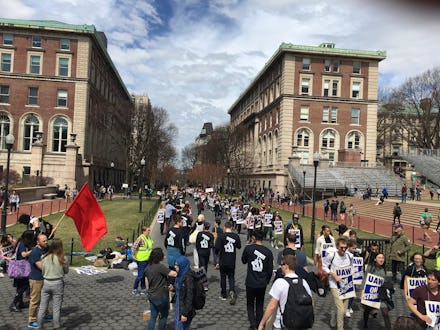Columbia University grad students go on strike after university refuses to negotiate

Hundreds of members of Columbia University’s graduate student union picketed on the school’s main quad Tuesday morning after a strike deadline imposed with the intention of forcing school administrators to the bargaining table came and went.
In December, a supermajority of Columbia’s graduate students voted to unionize with the United Auto Workers, which came after a ruling by the National Labor Relations Board that graduate students at private universities have the right to unionize. But in the months since, school administrators have repeatedly declined to bargain with the union and have insisted they plan to appeal the vote at the federal level.
The reticence spurred members of the Graduate Workers of Columbia University-UAW to impose a deadline on administrators of 10 a.m. Tuesday, with the union warning that workers would walk out of classrooms, labs and research facilities if university officials continued to “defy both labor law and the democratic voice of its workers.”
“If the university ... does not agree to bargain by that date, we will go on strike immediately on April 24, and continue the strike through the end of classes (April 30),” the notice read.
Kate McIntyre, a fifth-year Ph.D. student studying English who attended the strike on Tuesday, said that the timing of Columbia President Lee Bollinger’s decision to contest the union vote is no coincidence: “They’re counting on Trump,” she said.
“They’re assuming that a conservative NLRB will reverse our right to organize and unionize through collective bargaining,” McIntyre continued. “I don’t think there are any principles involved. I think this is purely the administration refusing to cede power to its workers.”
At Columbia, it’s not uncommon for graduate students to work part-time as teacher’s assistants or resident advisors, grading papers and fielding questions from undergraduates during office hours while also balancing research for their own advanced degrees. Mic has previously reported on how students’ heavy workload — coupled with paltry health care benefits, late paychecks and a lack of affordable housing opportunities — has helped create widespread support for union representation.
While graduate student workers turned out by the hundreds to strike on Tuesday, they were also flanked by their undergraduate and professor peers who turned out to support the cause.
Meghan Brophy, a 19-year-old Barnard College sophomore and organizer with Student-Worker Solidarity — a group of Barnard and Columbia students who advocate for union rights and economic justice — said she was rallying in support of the graduate student workers because “teaching conditions are learning conditions.”
“I think it’s really awful that teaching assistants, graduate instructors and research assistants are paid late and low wages, and don’t have proper recourse from sexual harassment and discrimination in the workplace,” Brophy said. “I think it’s my duty as a student here to come and fight alongside them.”
In response to the union’s request for bargaining, the university has repeatedly said that it would prefer to take the issue to court. In a statement to Mic, Caroline Adelman, director of media relations at Columbia, questioned why graduate students would use “the pressure tactics and disruption of a strike” rather than resolving the dispute in the federal court system.
“We respect the rights of students to express their views ... We have long supported unions and collectively bargain with more than a dozen unions representing thousands of university employees,” Adelman wrote. “But we believe that student teaching and research assistants who come to Columbia for an education are not ‘employees’ under the law.”
If the case winds up in a judicial appeals court and the NLRB’s decision is upheld, it will be a landmark ruling for graduate workers seeking to form unions at private universities. While New York University is currently the only private university in the country with a recognized graduate student union, Harvard University’s eligible workers recently voted 1,931 to 1,523 in favor of unionization.